| Oliver Bell Bunce | |
|---|---|
 | |
| Born | February 8, 1828 New York City |
| Died | May 15, 1890 (aged 62) New York City |
Oliver Bell Bunce (February 8, 1828 – May 15, 1890) was an American author, editor, and playwright.
| Oliver Bell Bunce | |
|---|---|
 | |
| Born | February 8, 1828 New York City |
| Died | May 15, 1890 (aged 62) New York City |
Oliver Bell Bunce (February 8, 1828 – May 15, 1890) was an American author, editor, and playwright.
He was born in New York City, in his youth he joined his uncle's stationery house Jansen & Bell.

The City of New York, usually called either New York City (NYC) or simply New York (NY), is the most populous city in the United States. With an estimated 2017 population of 8,622,698 distributed over a land area of about 302.6 square miles (784 km2), New York is also the most densely populated major city in the United States. Located at the southern tip of the state of New York, the city is the center of the New York metropolitan area, the largest metropolitan area in the world by urban landmass and one of the world's most populous megacities, with an estimated 20,320,876 people in its 2017 Metropolitan Statistical Area and 23,876,155 residents in its Combined Statistical Area. A global power city, New York City has been described as the cultural, financial, and media capital of the world, and exerts a significant impact upon commerce, entertainment, research, technology, education, politics, tourism, art, fashion, and sports. The city's fast pace has inspired the term New York minute. Home to the headquarters of the United Nations, New York is an important center for international diplomacy.
While connected with this house he began writing plays, several of which were brought out. Fate or the Prophecy, a tragedy in blank verso, and Marco Bozzaris were played by James W. Wallack, and Love in '76, a comedy, was played by Laura Keene in the leading woman's role. He also wrote a series of historical sketches which were afterward collected and published in a volume entitled The Romance of the Revolution. In 1854 Bunce and his brother established a publishing house with the firm name of Bunce & Brother. This firm published Ann S. Stephens's Monthly and Bunce acted as its editor. But the firm not being successful for lack of sufficient capital, was dissolved after a few years and he became manager of the publishing house of James G. Gregory, a position which he retained until some years after the death of the senior member of the firm. For a short time he was connected with the house of Harper & Brothers as literary reader. In 1867 he formed a connection with D. Appleton & Company, which continued until his death. When Appletons' Journal was established in 1869, Bunce was made associate editor, and upon the retirement of Robert Carter in 1872, he became its chief editor. Bunce also authored several books, novels, and essays of dramatic criticism. He died in New York City. After his death, his widow published articles and recipes under the name Mrs. Oliver Bell Bunce. [1]
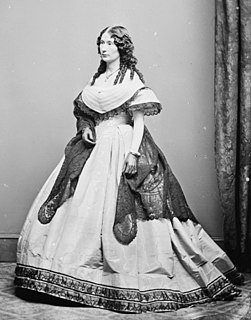
Laura Keene was a British stage actress and theatre manager. In her twenty-year career, she became known as the first powerful female manager in New York. She is most famous for being the lead actress in the play Our American Cousin, which was attended by President Abraham Lincoln at Ford's Theater in Washington, D.C., on the evening of his assassination.

Ann Sophia Stephens (1810–1886) was an American novelist and magazine editor. She was the author of dime novels and is credited as the progenitor of that genre.

D. Appleton & Company was an American company founded by Daniel Appleton, who opened a general store which included books. He published his first book in 1831. The company's publications gradually extended over the entire field of literature. It issued the works of contemporary scientists at moderate prices, for example, Herbert Spencer, John Tyndall, Thomas Huxley, Charles Darwin, etc. Medical books formed a special department, and books in the Spanish language for the South American market were a specialty which the firm made its own. In belles lettres and American history, it had a strong list of names among its authors.

Charles John Huffam Dickens was an English writer and social critic. He created some of the world's best-known fictional characters and is regarded by many as the greatest novelist of the Victorian era. His works enjoyed unprecedented popularity during his lifetime, and by the 20th century critics and scholars had recognised him as a literary genius. His novels and short stories are still widely read today.

Henry James, OM was an American-British author regarded as a key transitional figure between literary realism and literary modernism, and is considered by many to be among the greatest novelists in the English language. He was the son of Henry James Sr. and the brother of renowned philosopher and psychologist William James and diarist Alice James.

Jonathan Cape is a London publishing firm founded in 1921 by Herbert Jonathan Cape, who was head of the firm until his death in 1960.

Viking Press is an American publishing company now owned by Penguin Random House. It was founded in New York City on March 1, 1925, by Harold K. Guinzburg and George S. Oppenheim and then acquired by the Penguin Group in 1975.
The Irish Literary Revival was a flowering of Irish literary talent in the late 19th and early 20th century.

James Thomas Fields was an American publisher, editor, and poet.
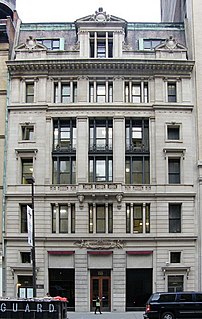
Charles Scribner's Sons, or simply Scribner's or Scribner, is an American publisher based in New York City, known for publishing American authors including Ernest Hemingway, F. Scott Fitzgerald, Kurt Vonnegut, Marjorie Kinnan Rawlings, Stephen King, Robert A. Heinlein, Thomas Wolfe, George Santayana, John Clellon Holmes, Don DeLillo, and Edith Wharton.

Alfred A. Knopf, Inc. is a New York publishing house that was founded by Alfred A. Knopf Sr. and Blanche Knopf in 1915. Blanche and Alfred traveled abroad regularly and were known for publishing European, Asian, and Latin American writers in addition to leading American literary trends. It was acquired by Random House in 1960, which was later acquired by Bertelsmann in 1998, and is now part of the Knopf Doubleday Publishing Group. The Knopf publishing house is associated with its borzoi colophon, which was designed by co-founder Blanche Knopf in 1925.
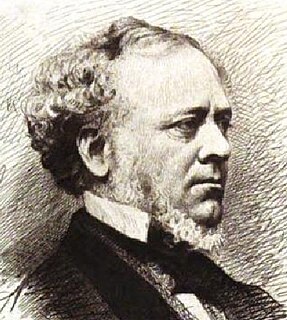
William Davis Ticknor I was an American publisher in Boston, Massachusetts, USA, and a founder of the publishing house Ticknor and Fields.

Johann Friedrich, Freiherr Cotta von Cottendorf was a German publisher, industrial pioneer and politician.

Harold Bell Wright was a best-selling American writer of fiction, essays, and nonfiction. Although mostly forgotten or ignored after the middle of the 20th century, he is said to have been the first American writer to sell a million copies of a novel and the first to make $1 million from writing fiction. Between 1902 and 1942 Wright wrote 19 books, several stage plays, and many magazine articles. More than 15 movies were made or claimed to be made from Wright's stories, including Gary Cooper's first major movie, The Winning of Barbara Worth (1926) and the John Wayne film The Shepherd of the Hills (1941).
Little, Brown and Company is an American publisher founded in 1837 by Charles Coffin Little and his partner, James Brown, and for close to two centuries has published fiction and nonfiction by American authors. Early lists featured Little Women by Louisa May Alcott, Emily Dickinson's poetry, and Bartlett's Familiar Quotations. As of 2016, Little, Brown & Company is a division of the Hachette Book Group.
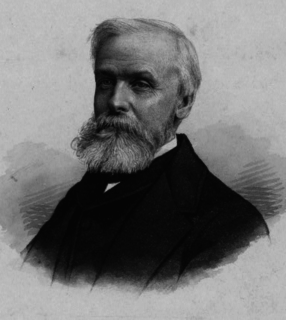
Evert Augustus Duyckinck was an American publisher and biographer. He was associated with the literary side of the Young America movement in New York.

William Henry Appleton was an American publisher, eldest son and successor of Daniel Appleton.

James Brown was an American publisher and co-founder of Little, Brown and Company.

Alfred-Henry-Armand Mame was a French printer and publisher.

Ticknor and Fields was an American publishing company based in Boston, Massachusetts.
Jonathan Leavitt was a bookbinder who later co-founded the New York City publishing firm of Leavitt & Trow, one of the nation's first publishing houses. Leavitt was also co-founder of another early New York publishing house with his brother-in-law Daniel Appleton. George Palmer Putnam, who went on to found a New York publishing dynasty, received his first job from Leavitt. Eventually Jonathan Leavitt went into business on his own, and after his death the firm was run by his son George Ayres Leavitt.

Richard Bentley was a 19th-century English publisher born into a publishing family. He started a firm with his brother in 1819. Ten years later, he went into partnership with the publisher Henry Colburn. Although the business was often successful, publishing the famous "Standard Novels" series, they ended their partnership in acrimony three years later. Bentley continued alone profitably in the 1830s and early 1840s, establishing the well-known periodical Bentley's Miscellany. However, the periodical went into decline after its editor, Charles Dickens, left. Bentley's business started to falter after 1843 and he sold many of his copyrights. Only 15 years later did it begin to recover.
![]()
The public domain consists of all the creative works to which no exclusive intellectual property rights apply. Those rights may have expired, been forfeited, expressly waived, or may be inapplicable.
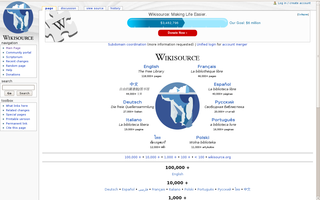
Wikisource is an online digital library of free content textual sources on a wiki, operated by the Wikimedia Foundation. Wikisource is the name of the project as a whole and the name for each instance of that project ; multiple Wikisources make up the overall project of Wikisource. The project's aims are to host all forms of free text, in many languages, and translations. Originally conceived as an archive to store useful or important historical texts, it has expanded to become a general-content library. The project officially began in November 24, 2003 under the name Project Sourceberg, a play on the famous Project Gutenberg. The name Wikisource was adopted later that year and it received its own domain name seven months later.

The Internet Archive is a San Francisco–based nonprofit digital library with the stated mission of "universal access to all knowledge." It provides free public access to collections of digitized materials, including websites, software applications/games, music, movies/videos, moving images, and millions of public-domain books. In addition to its archiving function, the Archive is an activist organization, advocating for a free and open Internet.
| This article about an American playwright is a stub. You can help Wikipedia by expanding it. |